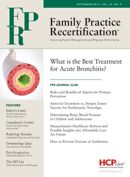Publication
Article
Family Practice Recertification
What is the Best Treatment for Acute Bronchitis?
Author(s):
Efficacy of anti-inflammatory or antibiotic treatment in patients with non-complicated acute bronchitis and discoloured sputum: randomised placebo controlled trial
Review
Carl Llor; Ana Moragas; Carolina Bayona; Rosa Morros, Helena Pera, Oleguer Plana-Ripoll, Josep M Cots, Marc Miravitlles. BMJ 2013;347:f5762
Methods
The study was prospective, parallel group, single blinded, placebo controlled study by 25 general practitioners in Catalonia, Spain from April 2010 to January 2012. Patients diagnosed with acute bronchitis were randomized into one of 3 treatment arms (ibuprofen 600mg TID, amoxicillin-clavulanic acid 500mg/125mg TID, and placebo pill TID).
Although the pills for each treatment were not identical, they were sealed in identical containers before being given to investigators and remained sealed until distributed to patients. Patients were blinded to their treatment allocation. Symptoms were evaluated with patient’s daily symptom journal and at 2 follow up appointments at 2-4 days and 11-13 days (and again at 30 days for patients without cure at second follow-up). Pill counts were conducted at follow up and if appropriate pill counts were not returned, compliance was considered insufficient.
Patient Demographics
Eligible patients were aged 18-70-years-old without associated respiratory comorbidity or immunosuppression. Acute Bronchitis was diagnosed when patients were found to have a respiratory infection with symptoms less than one week in duration with the predominant symptom of cough as well as discolored sputum plus at least one other symptom of lower respiratory tract infection such as wheezing, dyspnea, chest pain. Patients with signs of severe infection or CXR indicative of pneumonia were excluded.
The average age of patients was 45.1 (SD 14.3years). 44% were men. Smoking and rates of diabetes were comparable between treatment arms with 37-40% represented by current smokers and 4-12% by diabetics.
Intervention (and control)
Patients were placed in one of 3 treatment arms. One group was given ibuprofen 600mg TID, the second was prescribed amoxicillin-clavulanic acid 500mg/125mg TID, and the third received placebo pill TID for ten days. Patients kept a symptom diary to measure duration of symptoms.
Outcomes & Main Results
The main outcome measure was number of days with frequent cough after the randomization visit. The median number of days with frequent cough was slightly lower among patients in the ibuprofen group (9 days, 95% confidence interval 8-10 days) compared to amoxicillin-clavulanic-acid group (11 days, 10-12 days), or placebo (11 days, 8-14 days).
However, these results were not statistically significant. Secondary outcomes of “clinical success” at end of treatment and time of overall symptom score resolution were also not statistically significant between treatment groups.
Adverse effects were most common in the antibiotic group with 12% reporting an adverse effect (verses 5% in the NSAID group and 3% in placebo group). Most of these were GI upset and 2 were suspected allergic reactions. One patient in the antibiotic arm was hospitalized in the ICU for severe GI hemorrhage.
Conclusion
No statistical differences were observed in the number of days with cough in patients treated with ibuprofen, amoxicillin-clavulanic acid, or placebo.
Commentary
This study provides two useful conclusions in the management of acute bronchitis. The first is the lack of efficacy of antibiotic therapy (and NSAID therapy) as compared to placebo in patients specifically with acute bronchitis with purulent sputum. Lower respiratory infections are almost always viral in nature and are one of the conditions for which antibiotics are overprescribed, especially when purulent sputum is present or when a patient presents multiple times to the office.
Clinical studies have shown that antibiotic treatment does not reduce the duration of symptoms in acute bronchitis significantly but few studies have measured efficacy when purulent is present as an inclusion criterion. Antibiotics are well established in treatment of acute exacerbations of COPD, especially when accompanied by purulent sputum and the results of this study show that these studies cannot be extrapolated to patients without chronic airway disease. Therefore, in patients without chronic airway disease, the production of purulent sputum is not an indication for antibiotic therapy in episodes of acute bronchitis.
The second useful conclusion is that NSAID treatment is no more efficacious in the duration of cough in acute bronchitis than either antibiotic therapy or placebo. This RCT addresses a recent shift in the view of respiratory infections from an infectious process to more of an inflammatory process. Recently, studies have shown NSAIDs may have a marginal benefit to patients with respiratory infection; however, meta-analysis of the data remains inconclusive. This study looks specifically at patients with acute lower respiratory infection symptoms, with cough as the complaint, and concludes that oral NSAID treatment is no more effective than placebo treatment.
The study is well generalizable to outpatient populations without chronic pulmonary disease and who are not immunosuppressed. Patients in the study had a mean age of 45.1-years-old with a relatively even distribution of men and women. Smoking history was also well distributed between the study arms.
The trial was run in Catalonia, Spain and no information is available on the socioeconomic or ethnic backgrounds of the participants or the general (non-pulmonary health of patients with the exception of smoking history and diabetic status). Another strength of the study is the well-defined inclusion criteria: patients must present with symptoms of less than one week, including cough (as predominant complaint) as well as discolored sputum and one other symptom associated with lower respiratory infection.
Some potential limits with the study include that it was only single blinded: the pills were not identical in each study arm, although they were similar in size and shape, and presumably patients were blinded to their content. The investigators did not evaluate the symptom diaries, which reduces the likelihood of intention bias. Finally, the outcomes were based on patients self-reporting symptoms, which could introduce bias. That being said, the use of similar diaries has been substantiated in many previous studies and a more objective measure of symptoms is not readily available.
The trial only can only make conclusions about the efficacy of the specific drugs used for treatment, which in this case were ibuprofen and amoxicillin-clavulanic acid. The authors did not include a macrolide antibiotic because the combination of antimicrobial and anti-inflammatory effects of this class of drugs could confound results. Further investigation of the efficacy of macrolides and/or combined NSAID and antibiotic treatment would prove helpful.
It is important not to prescribe antibiotics and/or NSAIDs for conditions for which they are not effective and this study can help guide our care. Both drugs can have adverse effects on both the individual patient as well as the greater community. Focus your treatment of Acute Bronchitis on managing the patient’s symptoms with OTC medication, and on the patient’s expectations about their path to recovery.






